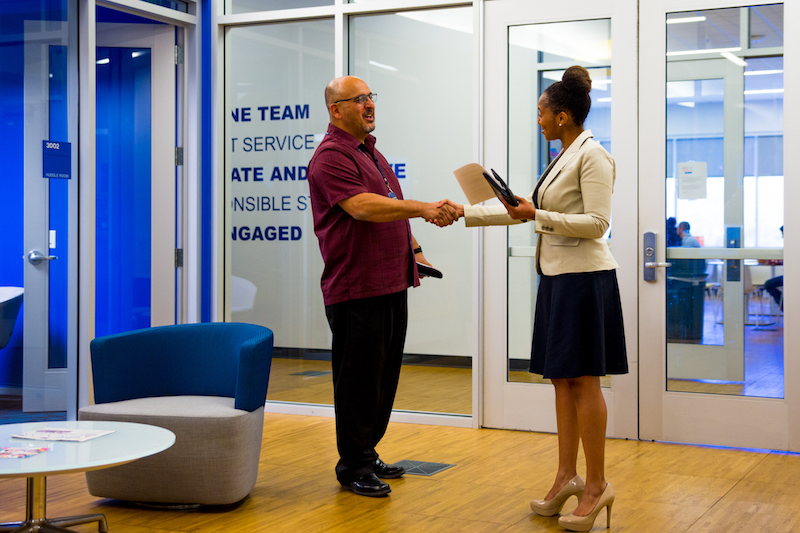Actively applying to a variety of jobs or exploring a different career path outside of what you may have studied in school may present exciting new options for your professional growth. One of the best ways to start exploring these opportunities is to discuss job and industry topics with more established professionals in a particular field, such as human resources or IT. These conversations may lead to a contact at a company that has your dream job and could possibly pave the way for a helpful informational interview.
What is an Informational Interview?
An informational interview is an opportunity to speak with a person working in a field you’d like to know more about. It’s not a job interview, but it’s an important step in your career search as it may help you learn more about a specific type of job, a person’s career path, or details about a particular industry or company. The informational interview can occur in a variety of modes, such as an in-person meeting, a video call, or phone call depending on which is best for the people participating.
Take Advantage of Informational Interviews
According to the University of California, Berkeley, informational interviews can help job seekers with the following:
- Get firsthand, relevant information about the realities of working within a particular field, industry or position. This kind of information is not always available online.
- Find out about career paths you did not know existed.
- Get tips about how to prepare for and enter a particular career.
- Learn what it’s like to work at a specific organization.
- Gain insider knowledge that can help you with writing your resume and cover letter, as well as giving pointers with interviewing.
- Initiate a professional relationship and expand your network of contacts in a specific career field; meet people who may forward job leads to you in the future.
Start off by conducting research about a particular industry, and both large companies and small firms in that industry.
Find Contacts
The next step in scheduling an informational interview is to tap into your network. The Balance, a human resources and personal finance website, advised job seekers to reach out to friends, family and acquaintances to see if they know anyone in the industry that they’re interested in exploring, and can make a connection.
A huge part of a successful job search is who you know. Your connections may know about jobs that aren’t posted yet, or can make valuable introductions to those looking to hire more staff. By seeking out informational interviews, you are expanding your network.
If there is a specific company where you’d like to work, consider contacting someone through LinkedIn to request an informational interview. You can also follow up with people you met during networking events, conferences or job fairs.
When reaching out to your contacts, introduce yourself briefly and communicate your hopes for the meeting at the beginning. While it might be nerve-wracking to cold-contact sources, keep in mind most people don’t mind taking 15-20 minutes out of their day to reflect upon their career and professional success, and to give advice on how to break into their field.
How to Prepare For This Conversation
Harvard Business Review recommends for those seeking to conduct informational interviews to do their homework, study up on industry lingo, learn who the biggest players are, and know about the most important trends in the industry.
And again, since it’s not a job interview, your conversation can be more candid. You can steer the conversation by inquiring about day-to-day tasks, as well as asking the person’s opinion about the state of the industry, and what they think the future holds.
Prepare a list of informed, intelligent questions ahead of time. Here are some questions to ask a contact during an informational interview:
- What kind of work/internship experience would employers look for in a job applicant? How does a person obtain this experience?
- What talents and skills do you feel are important in this work?
- What types of technology are used on this job? How are they used?
- Could you describe a typical day/week at this job?
- How did you first get involved in this field? What do you like the most about your work?
Follow Up and Express Thanks
It’s highly recommended by industry experts to send a thank-you note to your contact within 1-2 days to express your appreciation for their time and advice. Based on whether the informational interview was relatively informal or more businesslike, this may be a brief handwritten note, an email or a business letter. You can also connect with them on LinkedIn as well.
Lastly, keep in touch periodically to share updates and to check in. By building rapport with your new career contacts, it will increase your chances that they will help you when you are ready to take the next step in your job search.
If a career at the UCPath Center is in your sights, download this helpful guide for step-by-step tips on how to put together the perfect application package. You might also find these articles helpful:



